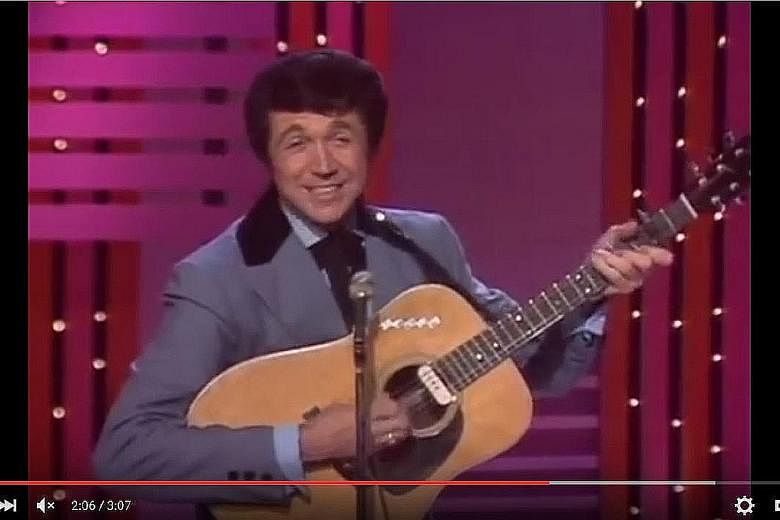NASHVILLE, TENNESSEE • Sonny James, a genial crooner of the 1960s and 1970s with 26 No. 1 country hits to his credit, died here on Monday. He was 87.
His death was announced on his website.
Nicknamed the Southern Gentleman for his affable manner and stylish mode of dress, he was best known for his 1956 hit, Young Love, a romantic ballad accompanied by acoustic guitar and doo-wop harmonies that topped the country and pop charts. It was the first of his No. 1 country singles.
Several of his subsequent records reached the country Top 10, but he did not have another No. 1 country single until 1964, when he released the romantic ballad, You're The Only World I Know. It was a turning point: Twenty-one of his next 25 singles also went to No. 1, including 16 in a row from 1967 to 1972, many of them similar professions of young love.
Virtually all were recorded in the smooth, sophisticated style of the reigning Nashville Sound, popularised by Jim Reeves and Patsy Cline.
But unlike other exponents of the Nashville Sound, who were drawn to material written expressly for the country market, James often recorded versions of recent pop and rhythm and blues hits, such as Roy Orbison's Only The Lonely from 1960 and blues singer Jimmy Reed's Bright Lights, Big City from 1961.
James' versions of both of those hits reached the top of the country chart during his late-1960s-toearly-1970s streak of consecutive No. 1's. So did his versions of soul singer Brook Benton's Endlessly and blues crooner Ivory Joe Hunter's Since I Met You, Baby.
James said he had been motivated to record R&B in part as a way to introduce songs that were popular among African-Americans to his mostly white, mainstream country music audiences - his hope being to promote amity between whites and blacks at a time of widespread racial turmoil in the United States.
James began recording versions of R&B hits around the time Nat King Cole died in 1965. Cole was one of America's few black singing stars and James had admired his crooning style. The two had become friends. Several photos on James' website show the two collaborating in the Capitol Records studios in Hollywood.
James was born James Hugh Loden on May 1, 1928, in rural Hackleburg, Alabama, northwest of Birmingham. His parents, Archie and Della Burleson Loden, worked a 121ha farm where, supported by three tenant families, they raised cotton, corn and other crops.
His parents played music and sang, as did his older sister, Thelma, with whom young "Sonny" appeared on the radio as a child. By the time he was a teenager, he was an accomplished guitar and fiddle player who had won a number of local fiddle contests.
In 1952, after serving in the Army during the Korean War, he moved to Nashville, where he signed a contract with Capitol.
Ken Nelson, James' producer at Capitol, was the one who urged him to adopt the stage name Sonny James, arguing that it would be easy for people to remember. The two men collaborated on a handful of Top 20 hits before James broke through with Young Love.
He is survived by his wife, the former Doris Shrode.
Young Love spent the better part of six months on the country and pop charts. But as he told music historian Dave Samuelson in an interview excerpted on James' website, it might have had even greater success if Capitol Records had been better prepared to meet public demand for the record.
"It caught the people in merchandising off guard," he explained, adding: "They didn't want to overpress before any record was released. The song surprised everybody, it hit so fast."
NEW YORK TIMES

